

Kurseong, a quaint hill station in the Darjeeling district of West Bengal, is known for its serene landscapes, lush tea gardens, and a pleasant climate that draws tourists year-round. Historically, Kurseong's tourism roots can be traced back to the British colonial period. The region was discovered by the British in the 19th century who found the climate here conducive to relaxation and escape from India's scorching summers. They established Kurseong as a reprieve from the heat and a center for tea production.
During the British era, Kurseong became a preferred summer resort for the British Raj officials. Built in 1835, the Kurseong Dak Bungalow is one of the oldest structures in the town, providing a historical insight into the colonial influence on the town's development as a tourist destination. The establishment of the Darjeeling Himalayan Railway in 1881, also a UNESCO World Heritage Site, further boosted tourism. This charming toy train, connecting the plains of Siliguri to the hills of Darjeeling, runs through Kurseong and creates an iconic travel experience for visitors.
Kurseong is often synonymous with its high-quality tea, and as such, tea tourism has developed as an attractive aspect of the region's tourism industry. There are several tea estates like Castleton, Makaibari, and Ambootia that offer guided tours, allowing visitors to learn about the history and craftsmanship behind the brew, and to stay in colonial-era bungalows amidst the beautiful tea gardens.
Apart from its natural beauty and tea estates, Kurseong's rich cultural tapestry contributes to its tourism allure. The influence of various cultures including Lepcha, Nepali, and British is evident in local festivals, architecture, and cuisine which attract many cultural enthusiasts.
With the changing times, eco-tourism and sustainable travel have become increasingly significant, and Kurseong is adapting to these trends. Many homestays and eco-friendly accommodations have sprung up, offering an immersive experience into the local lifestyle, while also preserving the natural beauty of the region.
In recent years, there has been a focus on developing offbeat travel experiences like village tours, bird watching, nature walks, and educational tours on the ecological significance of the region. These initiatives cater to the growing number of travelers seeking unique and responsible ways to explore their destinations.
Even with the advent of modern trends, the sense of tranquility and the old-world charm that Kurseong offers remain unmatched. Its tourism history woven intricately with nature, culture, and the colonial past, continues to enchant visitors from all corners of the world.